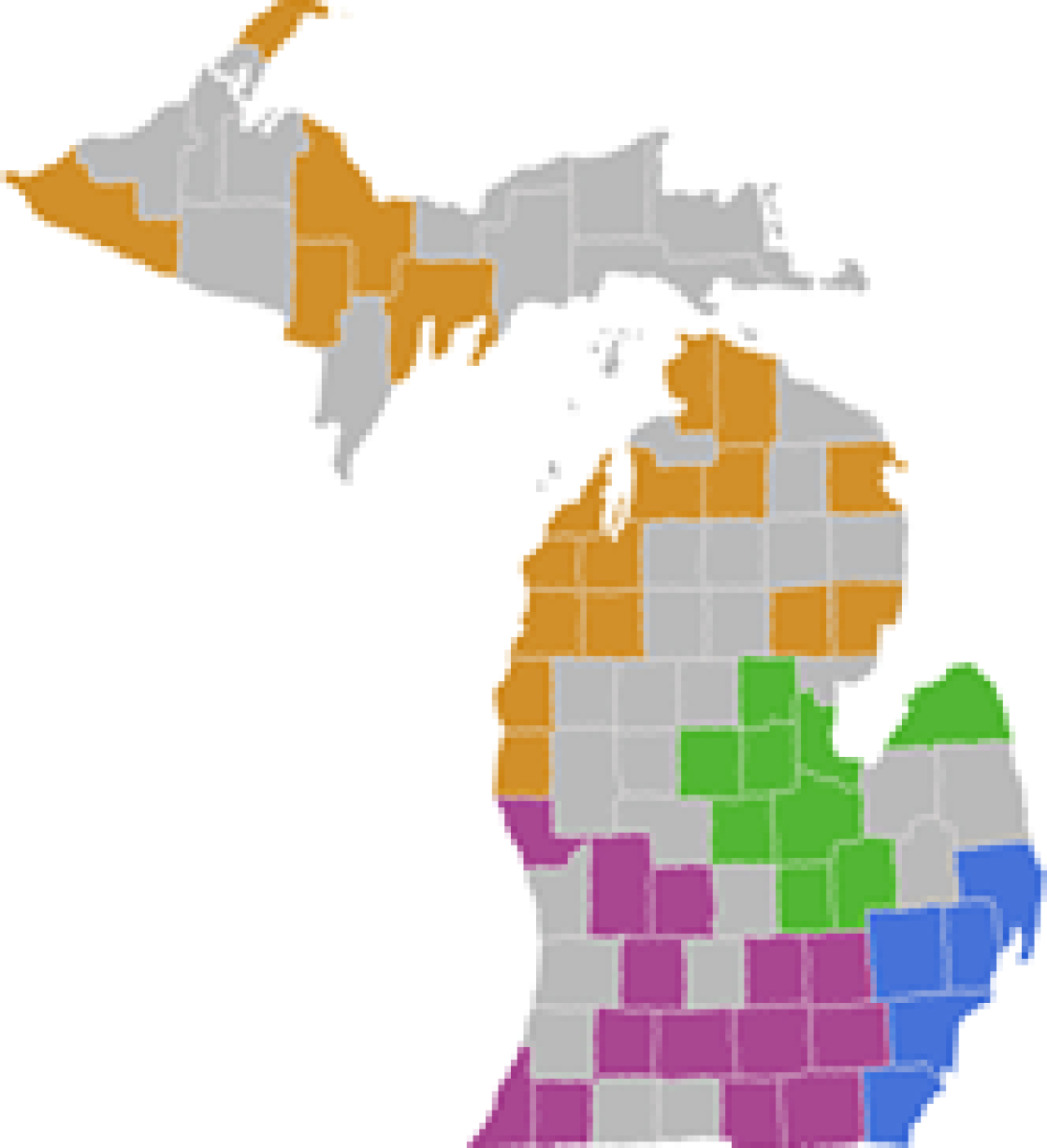
More than 1,000 Parkinson’s patients are treated at the University of Michigan each year.
For those with Parkinson’s disease, or disorders that mimic Parkinson’s disease, the University of Michigan offers comprehensive care delivered by an internationally recognized medical team, including neurologists that specialize in Movement Disorders. We treat more than 1,000 Parkinson’s patients each year as well as patients suffering from corticobasal degeneration, dementia with Lewy bodies, multiple system atrophy and progressive supranuclear palsy. Parkinson’s disease affects about one percent of people over the age of 60, and more than one million people in the United States. Parkinson’s usually begins after the age of 40, but younger patients can be affected. It is caused by the deterioration of nerve cells that make a chemical called dopamine. The disease generally presents slowly and progresses gradually over the years. The main signs of Parkinson’s disease are tremor, slowness of movement (called bradykinesia), stiffness (called rigidity), and poor balance. The tremor is a rest tremor, meaning that it is most noticeable when the limb is at rest and improves when the limb is in use. These symptoms are usually mild and barely noticeable in the early stages, but progressively worsen over time. Patients may also have symptoms that are not related to movement, many of which affect mental functioning, mood, senses and the ability to sleep or remain awake. As symptoms worsen, people may have difficulty walking, talking, or performing other tasks. It is important that patients discuss their symptoms with their physicians so that treatment can be started and optimized.
Improving Hospital Stays for Patients with Parkinson’s Disease Learning Module Kelvin L. Chou, MD, Professor of Neurology and Neurosurgery at the University of Michigan, Co-Director of the STIM (Surgical Therapies Improving Movement) Program, and the Education and Outreach Core Director for the U-M Udall Center of Excellence for Parkinson’s Disease, created and launched an e-learning module Improving Hospital Stays for Patients with Parkinson’s Disease Learning Module. This learning module is educating inpatient RNs, LPNs, pharmacists, house officers, and hospitalists about the specific and unique needs of the hospitalized PD patient. They will learn to identify medications that can lead to a worsening or exacerbation of symptoms, prolonging the hospital stay, and understand the importance of administering appropriate medications on time, every time, to the hospitalized patient with Parkinson’s disease. It is hoped the knowledge gained from this module will shorten hospitalization stays for patients with PD and provide them with a safer and more pleasant hospital experience.
Patients who come to the Movement Disorders Clinic are seen by a movement disorders specialist, a neurologist who has extra training in evaluating and treating a person with Parkinson’s disease. There are no blood or imaging tests that can confirm Parkinson’s disease, so diagnosis is based on visible signs and symptoms, which are reviewed during a medical history and neurologic examination. Despite the fact that Parkinson’s disease slowly worsens over a number of years, we now have effective medications that act on the dopamine system and allow patients to do well for a significant period of time. One of the best medications for the disease is called levodopa, which gets changed to dopamine in the brain and significantly improves symptoms. Other treatment options include dopamine agonists, COMT inhibitors, and MAO-B inhibitors, all of which help to enhance dopamine transmission in the brain. Early in the disease, medications may work well, but as time goes on patients may find the effects don’t last as long. They will feel slow, stiff, and many will develop dyskinesias or abnormal, involuntary movements. When people start experiencing these symptoms despite taking medications, deep brain stimulation surgery (DBS) is often recommended. DBS involves placing electrodes in precise locations of the brain. The electrodes are connected to a wire that runs underneath the skin to a battery in the chest. When electrical stimulation is delivered to the brain, the tremor improves. It’s like a pacemaker for the brain, instead of the heart. To make an appointment, call 734-764-6831.
Our Surgical Therapies Improving Movement (STIM) program includes one of the largest deep brain stimulation centers in the Midwest region. We have a multidisciplinary evaluation program for potential surgical candidates including members from neurology, neurosurgery, neuropsychology, speech pathology, radiology and social work. In addition, we are home to internationally-renowned researchers who are studying the underlying causes of Parkinson’s disease as well as new treatments. For those who qualify for the surgery, neurosurgery works closely with rehabilitation for patients who may need physical, occupational and speech therapy. DBS helps to relieve motor symptoms such as stiffness, improves the ability to move and may also reduce the severity of tremor. And whereas levodopa causes additional dyskinesias over time, DBS has been found to relieve them. Another benefit of DBS is that since electrical stimulation is constantly delivered to the brain, patients experience an increase in their “on” time – when motor function is good, while “off” times – when motor function is poor, are typically shorter and milder than before surgery.
Michigan Parkinson Foundation
The Michigan Parkinson Foundation has affiliated support groups across the state of Michigan. These groups generally meet on a monthly basis. Support groups provide people with PD and their families the opportunity to learn more about this condition and its management.
View Support Groups in Your Area
If there are no support groups in your area and you are interested in having one formed, please contact the Michigan Parkinson Foundation at (800) 852-9781.

Phone: 1-800-617-8711
Here you can find basic PD information as well as information on classes, events calendar and support group meetings in the Grand Rapids, Holland, Montcalm County and Muskegon areas. They also maintain a library of materials — accessible at meetings or by mail — to help patients and their families learn as much as possible about the disease.
Phone: 231-947-1946 (Maxine Meach) OR 231-947-7389 (Hettie Molvang)
Parkinson’s Network North is a non-profit organization based in Traverse City. Their mission is to empower individuals and families to meet the challenges of living with Parkinson’s Disease through sharing of information, education, personal support, and advocacy for a cure. They strive to maintain an up-to-date list of available community resources which may be helpful to people with Parkinson’s and their families, and they host an educational forum every summer.
National Parkinson Foundation (NPF) Helpline: 1-800-4PD-INFO (1-800-473-4636) The National Parkinson Foundation has excellent educational resources for patients caregivers and professionals alike. You can search or browse their PD library for books, videos & webcasts, DVD’s, PD-related websites and NPF publications. Many of the NPF publications can be viewed online or can be mailed to you at low/no cost and some are available for download. They have developed an excellent and comprehensive series of manuals addressing various aspects of living with Parkinson’s. They also have a newsletter which you can sign up to receive electronically or through the mail. Parkinson’s Disease Foundation (PDF) Helpline: 1-800-457-6676 The Parkinson’s Disease Foundation has numerous educational/informational publications that can be ordered free of charge. They have excellent resources for learning about and living with PD including an informational packet geared towards “newly diagnosed”. They have regular online seminars on PD related topics, as well as user-friendly, printable fact sheets on various topics. Their newsletter is available online or you can sign up to receive electronic or print copies. They also have a comprehensive guide that includes over 650 community resources throughout the US and around the world. It is available in print and is searchable online. National Institute of Neurological Disorders and Stroke The NINDS website contains extensive information about neurological disorders including Parkinson’s disease. Disease-specific information as well as information about research is available on the site. Also included is an extensive list of government resources.
Michigan Resources:
Research Website:
Resource Websites:
- American Parkinson Disease Foundation (APDA)
- Parkinson’s Society of Canada
- International Parkinson and Movement Disorder Society
Young Onset Resource:
Parkinson Plus Organizations:
- Essential Tremor
- Society for Progressive Supranuclear Palsy Society for PSP
- Multiple System Atrophy: The MSA Coalition
Additional Resources:
Online Parkinson Resources: